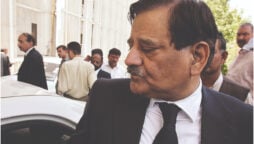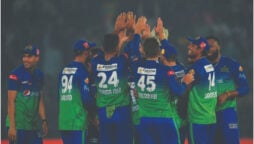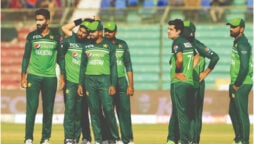
Chaos, Confusion mar Pakistan cricket
It has been awful season for Pakistan cricket both on the field and off the field
Let’s face it. It’s been an awful season at home for Pakistan cricket. An annus horribilis in terms of results, never mind the claims by the coach and captain of winning sessions and dominating the games and assigning the ills to qudrat ka nizam.
But off the field, it’s been no different, with both Ramiz Raja and the tag team of Najam Sethi and Shakeel Sheikh with their cheerleaders in the media slugging it out in virtual space for all to see and binge-watch.
Ramiz has had more to lose in this slugfest. He doesn’t have the political baggage that has soured the reputation of Najam Sethi.
Had he gone quietly, accepting that it was sort of a legal way in for Sethi through a government directive, he would have been better appreciated and wouldn’t have had his weaknesses (real or imagined) brought to the fore on social media.
He’s built on his being part of the 1992 World Cup team and then through his commentary and had more to lose certainly. And he has.
Sethi, on the other hand, has already had much to answer ever since his stint as caretaker chief minister in Punjab and his open tilt toward the hugely unpopular PDM.
He can only gain from this confrontation by dragging down Ramiz and some bloopers of his and riding on them to make himself seem more of a hope.
It was bad enough that a lot of what good Ramiz did, such as the Pathways program which resulted in the Pakistan Junior League, has been dismantled.
It has to be said that PJL was extremely well organized and produced for television at par with PSL in all aspects.
The standard of play was not much less than the professional cricket played today in the top leagues. Then Pakistan was the first to announce a women’s league on the lines of PSL. That too has been put on the back burner by the current management.
Most important of all has been the return of departmental cricket and the hybrid structure where both associations and departments will play separate tournaments throughout the season.
Considering the government is hard pressed for cash and consequently the government and semi-government organizations, taking out the budget for maintaining these teams will be a challenge; certainly whatever money is forced out from these organizations by directives from Islamabad could have been better spent on current employees’ welfare.
I just fear that if they force companies like SSGC, SNGPL, PIA and others to spend millions on the teams (keeping in mind these organizations will also be forced to build other sports teams as well) they might pass on the cost to their consumers and raise tariffs. Or ask for subsidies from the government.
That though is still far away and who knows the man who eliminated departmental teams may just be in charge by the time the new season arrives. At a time when the political parties don’t know their tomorrow, what happens at Gaddafi Stadium come September is like trying to drive through the Lahore mist at its darkest.

There are more pressing matters that Sethi & Co. have to resolve, some of their own making. One of the first announcements they made was that Saqlain would cease to be the coach after the New Zealand tour.
Firstly, for the sake of team spirit and to avoid creating uncertainty in the minds of the players, they could have held back any announcement. Then to top it off, the chairman started postulating his theory that only a foreign coach can manage the team as he carries no local biases.
Ridiculous, India has risen to the top with Anil Kumble, Ravi Shastri and now Rahul Dravid in the side and they come from similar society and culture biases as us. And if that is the case then shouldn’t the chairman be a foreigner as well, considering how much politics, destructive at that, is done from the offices of the PCB?
Coming back to the coach appointment and suggesting a foreign coach, it is admitting to the world that the players and the captain are doing politics. Certainly. Some favouritism has been there but so it was at the time of Richard Pybus, Bob Woolmer, Geoff Lawson, Dav Whatmore and Mickey Arthur.
I mean Wasim Akram, Waqar Younis, Inzamam-ul-Haq virtually rain the team at their whim under them and later everyone from Shoaib Malik, Mohammad Hafeez, Shahid Afridi and Misbah ul Haq played their favoured ones over those who had stronger merits for the place.
Look, the foreign coaches come to Pakistan to earn dollars and a hefty amount of them. In fact, all coaches do. If they feel the captain and senior players form a clique and select whom they want he might counter their arguments but eventually he’ll go along with it until he’s offered a bigger amount elsewhere.
He rationalises by telling himself that it’s the chairman who’s appointed the captain and publicly backs him and he’s often the most influential player of the eleven, so why get on his wrong side? He doesn’t carry the pain of the country or the fans; he’s a professional working for dollars.
Yes, he’ll make his best efforts to improve and win but unless he has the ultimate authority power to select the final eleven or change the captain, he’ll give in.
And the junior players will see that the coach is just going along with the captain and fall in with the captain’s philosophy and demands. As it is half or more of the players don’t really understand a lot of what the coach is saying, considering the language barrier and sometimes the accent too.
As such whether it’s a Pakistani coach or a foreigner doesn’t matter if the system allows for favouritism and egos to take root in the game. If the system is self-sustaining and the culture is of team and country first (forget the public expressions to that effect), any coach with requisite skills can do the job and do it well.
Nevertheless, the way PCB and more specifically Najam Sethi has gone about has caused chaos and confusion. By announcing at a hastily called media briefing, he revealed that he had called up Mickey Arthur who later refused. Then there were news that approaches had been made to Andy Flower, Tom Moody and Justin Langer but each has excused himself.
This is embarrassing and insulting and again PCB has only called in the strike on themselves. Just advertise the position and ask for applications.
Whoever is interested will apply. It will be more respectful for the PCB. Pakistan’s next international assignment is against New Zealand again in April so there’s enough time to ask for applicants and have interviews.
Even ECB, despite knowing that it is a lucrative and attractive position, advertised it and went through due process before settling on Brendon McCullum.
Regarding captaincy, I personally feel there is weight in appointing separate captains for red and white-ball cricket. Within white-ball, there can be separate captains too for the two formats but to start with having a separate captain for ODIs and T20s and a different one for Test matches has become necessary.
Firstly, it requires very different approaches. Misbah was a good Test captain but just couldn’t get the hang of it in ODIs where there is less time to make decisions and one wrong move can cost you the game.
You need a quick thinker and an innovative mind and a keen eye in the nets. It’s what made Imran bowl specialist batter Ijaz Ahmed in the ODIs to good effect. Earlier to that Mike Brearley consistently threw the ball to Geoffrey Boycott at crucial moments of the game during the 1979 World Cup.
For those who cite Babar Azam’s batting prowess and standing in the world of cricket, I would match him with Joe Root.
He too was the best Test bat for England scoring more than a third of the runs alone during his time at the helm. Yet he had one win in his last 17 Tests before Ben Stokes was brought in. Since then, England have won 9 of 10 Tests. Root is still their best batter.
What didn’t work for England was keeping both James Anderson and Stuart Broad out of the team or playing one alternatively.
Root was at the center of that strategy. The first thing that Stokes did was call them back in together last summer and England have never looked back from that time.
Yes, Brendon McCullum has had his say but Stokes had vowed to play both before McCullum was hired as a coach.
The approach too has changed on its head, something that needs changing in the Pakistan team as well. Not that the Pakistan side has to copy-paste their style but certainly move to a more positive mindset.
Secondly, having different captains allows the other captain to tax his brainless and focus on his play. If he isn’t part of the other format then it allows him to take a break, rejuvenate those tired muscles and maybe avoid injury.
Thirdly, other players who have a good brain get the opportunity to play out their plans which could be beneficial for the side.
And last, neither captain gets too complacent. If one captain in one format is doing wonders there is a natural pressure built on the other captain to do well too. That forces him to get out of his comfort zone and be bolder and more creative.
True there are instances where one captain can do both formats. Kane Williamson led New Zealand to the final of the ODI World Cup and the Test Championship as well as to the T20 Worlds Cup semi-final, all within two years.
But if England have had Root and Morgan and now Stokes and Buttler, Australia have had Finch with Cummins in white and red ball and India are now seriously contemplating Hardik Pandya for T20 and keeping Rohit Sharma for Tests while keeping the option open for another in ODIs, this structure must have some good coming out of it.
Sohaib Alvi has been covering cricket at home and abroad for over 40 years as columnist, editor, analyst, TV expert/host. An MBA from IBA he has simultaneously had a 35-year career in the corporate sector, having worked in C-Suite positions. He now advises clients on leadership, business strategy, marketing and organizational planning.
Catch all the Champion News, Breaking News Event and Latest News Updates on The BOL News
Download The BOL News App to get the Daily News Update & Live News.












 Read the complete story text.
Read the complete story text. Listen to audio of the story.
Listen to audio of the story.